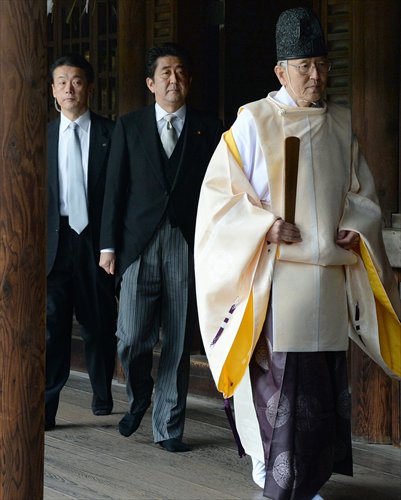China, S.Korea slam Abe’s shrine visit

A Shinto priest (right) leads Japanese Prime Minister Shinzo Abe (center) as he visits the controversial Yasukuni Shrine in Tokyo on Thursday. Photo: AFP
China on Thursday slammed Japanese Prime Minister Shinzo Abe for paying an inflammatory visit to the Yasukuni Shrine, and warned that Tokyo will bear consequences.
South Korea also blasted the "anachronistic" move and Tokyo's chief ally the US declared itself "disappointed" with Abe's act that will "exacerbate tensions with Japan's neighbors."
Abe described his visit as a pledge against war and said it was not aimed at hurting feelings in China or South Korea.
The Yasukuni Shrine is the believed repository of around 2.5 million souls of Japan's war dead, most of them common soldiers. However, 14 Class-A war criminals from World War II who committed heinous crimes against the victimized Asian people remain honored there.
"Some people criticize the visit to Yasukuni as paying homage to war criminals, but the purpose of my visit today is to renew the pledge that Japan must never wage a war again," Abe said in a statement released after the visit.
Stressing that it was natural for a nation's leader to pay his respects to those who died for their country, Abe said, "I have no intention to hurt the feelings of the Chinese or South Korean people."
China's foreign minister Wang Yi Thursday summoned Japanese Ambassador to China Masato Kitera to lodge solemn representations with and strong protest against Abe's visit to the Yasukuni Shrine.
"The act of Japan's Prime Minister Shinzo Abe to pay a blatant homage to the Yasukuni Shrine where Class-A war criminals of World War II are honored is against the tide of history, which not only openly challenges international justice but also grossly tramples on human conscience," said Wang.
Chinese foreign ministry spokesman Qin Gang Thursday said "Abe's visit to the Yasukuni Shrine jeopardizes the political foundation of China-Japan relations and erects new barriers to the improvement and growth of bilateral relations. The Japanese side must take all the consequences arising therefrom." China's defense ministry Thursday made a similar comment over the issue.
In what seems to be a reaction to Abe's visit, Chinese Vice Premier Liu Yandong reportedly cancelled a meeting with Japanese parliament members on Thursday.
South Korea Thursday termed the visit a deplorable and anachronistic act that damaged ties between the two countries and summoned a top Japanese diplomat in Seoul to protest.
"The visit ... is an anachronistic behavior that fundamentally damages not only relations between the South and Japan but also the stability and cooperation of Northeast Asia," Seoul's culture minister Yoo Jin-ryong told reporters.
"Sino-Japanese relations had been expected to have some improvement in 2014, but Abe's act further froze the already chilled bilateral relationship," Hu Lingyuan, a professor with the Center for Japanese Studies at Fudan University, told the Global Times.
Japan's ally the US Thursday also expressed its criticism, with a statement by the US Embassy in Tokyo saying "The United States is disappointed that Japan's leadership has taken an action that will exacerbate tensions with Japan's neighbors."
Fuji News Network Thursday reported that the US in November demanded Abe give up the plan to visit the shrine, fearing the tension between China and Japan would break the stability of East Asia.
Wang Ping, a research fellow with the Institute of Japanese Studies at the Chinese Academy of Social Sciences, told the Global Times that as the US formulated the pacifist constitution for Japan, Japan's attempts to deny the post-World War II order would also be a gesture to deny the US.
The visit came exactly 12 months after Abe took power and the last incumbent Japanese prime minister to visit the shrine was Junichiro Koizumi in 2006.
Wang Ping said that Abe had publicly expressed his willingness to visit the Yasukuni Shrine this year and he hopes to show the image of a man who keeps his promises by paying the visit on the first anniversary of taking office.
Hu noted that 2014 will be a key year for Abe to implement Japan's new security strategy and medium-term defense buildup plan as well as attempts to broaden the role of the military to permit collective self-defense.
"Abe is trying to arouse a mood of domestic nationalism, creating a good atmosphere," said Hu.
Japan's ruling camp were divided on Abe's visit, while the opposition criticized his visit to the controversial shrine.
Natsuo Yamaguchi, leader of the New Komeito Party, which is a part of the ruling bloc, said he expressed opposition to the prime minister before the shrine visit, adding that Abe has to cope with the impact on Japan's foreign relations by himself as he clearly understands the aftermath of his visit.
Secretary General of Japan's Social Democratic Party Mataichi Seiji criticized Abe's move as unbelievable, saying it is active militarism after the prime minister said he would follow a proactive pacifist road.
Agencies contributed to this story